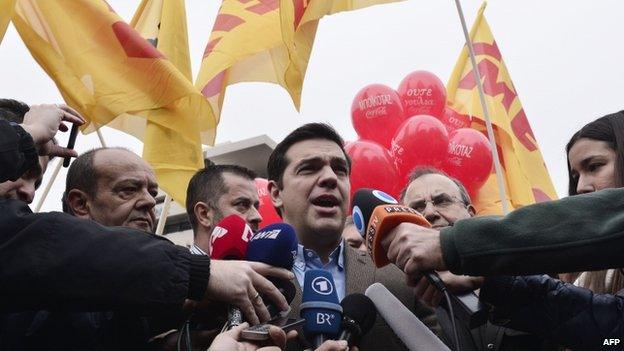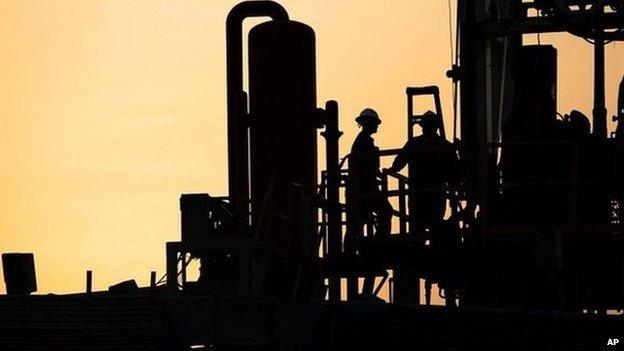Politics is the big risk to the euro
- Published
- comments

Alexis Tsipras's radical left Syriza party leads the polls and wants to renegotiate Greece's bailout
The 2010 general election was fought under the dark shadow of a financial crisis in Greece that was infecting the eurozone - and was bound to damage the UK's economy.
So I start 2015 wondering why I feel five years older, since nothing much seems to have changed around me: there appears to be a general election looming here and something of a financial calamity brewing in Greece and in the euro area.
Here is what strikes me: the eurozone is both stronger and sicker than in 2010.
How so?
Well, the eurozone is stronger in that it has put in place financial buffers to absorb the losses that would be generated if Greece were to unilaterally renege on its debts, and even be forced out of the eurozone - which could happen if Syriza wins the 25 January elections (though the language of the left wing party has become less aggressive towards the euro).
It would be hugely damaging to economic confidence if there were a further Greek debt default.
But this time there would not be a domino effect of collapsing banks and collapsing economies: losses on official loans to Greece would be shared in an orderly way between eurozone governments, banks are better capitalised than they were, and there is a more effective system in place to scrutinise and protect them (the limited "banking union" established last year).
As for the other eurozone governments that were massively financially overstretched, Portugal, Ireland, Spain, and Cyprus, they are not the basket cases they were.
They would not be abandoned by their creditors if Greece went pop.
But the eurozone is also fundamentally sicker than it was in 2010 - in that it has proved itself unable to grow and recover, even when the US and the UK have been enjoying significant and sustained economic expansion.
There is little growth anywhere in the eurozone, unemployment remains stubbornly high and has been edging up (and is not far off twice the UK rate), and inflation is widely seen as dangerously low - in the sense that it could turn into the kind of deflation that would discourage businesses and households from spending (why spend today when things will be cheaper tomorrow?).
In other words the euro is not seen to be working for the people of the eurozone.

The euro area is a huge consumer of oil
That said, the euro area is a huge consumer of oil, so the tumbling oil price should put money into the pockets of consumers and companies. But if they are feeling glum, which they seem to be, they may hoard it - which would not be a fat lot of good.
The other related sense in which the eurozone is much weaker than it was is that anti-euro and anti-EU political parties are gaining enormous popular support all over the region.
Where that currently matters most is in France and Spain, where the Front National from the right and Podemos from the left are respectively posing existential challenges to the political establishment.
Or to put it another way, Greece will not be the last eurozone country where a party hostile to the tenets of the great European project will be seen as on the cusp of power.
Break-up risk
So politics, rather than economics, is now what challenges the long-term survival of the euro.
And unless and until eurozone countries find a way to restore optimism to their people that living standards can rise as well as fall, the serious risk of a eurozone break-up will remain.
What is required is fundamental economic reform to make the economies of Spain, France and Italy in particular more competitive - and also a political union that pools the enormous financial resources of Germany with those of the rest.
Neither is just around the corner.
So the eurozone limps on, on a drip feed of cheap money supplied by the European Central Bank (ECB).
The ECB has signalled that it is about to embark later this month on its most symbolically important initiative to cut borrowing costs, the kind of quantitative easing that would involve purchases of government bonds.
That is inevitable for two reasons.
First is that on Wednesday the eurozone's headline inflation rate will be zero or - probably - slightly negative. Deflation has been lumbering down the tracks and some will be able to claim that it is actually in the station (it has already arrived in a number of countries, including Spain).
In other words, the ECB will be so adrift from its mandate of 2% inflation that more evasive action becomes almost automatic.
Also it has said it wants to expand its balance sheet by a trillion euros in its pursuit of increasing the flow of credit and cutting its cost. And, as Morgan Stanley has pointed out, without proper quantitative easing its existing asset purchase and lending initiatives will leave it more than €500bn adrift from that target.
So what we think of in the UK and US as proper QE is coming to the eurozone soon.
But QE is no more than a drip for a patient on life support. It is not the cure for the region's basic ailments.
What's more, QE eurozone-style may have significantly less oomph than its Bank of England and Federal Reserve versions.
How so?
Well, there are signs that the Germans will succeed in blocking the ECB from buying the lower-quality government bonds of the weaker economies of southern Europe.
QE may be constructed so that the ECB can buy only the highest quality debt, of financially strong governments like, well, Germany itself.
But investors are already literally giving money to Germany for nothing. It does not need its debt to be cheaper.
It's southern Europe which needs a guarantee of cheap money.
Now, under a hybrid QE scheme, the central banks of the weaker peripheral countries may be permitted to buy the debts of their respective governments, if the ECB won't - and that might help to bring down borrowing costs.
But such a hybrid approach would also be yet another spectacular manifestation of German refusal to help out its ailing neighbours.
That would leave investors profoundly unimpressed about the ability of the euro's members to properly pull together to sort themselves out.
Their wariness about investing in the eurozone might be reinforced - thus leaving the eurozone and its assets even less loved by the world's big money people.